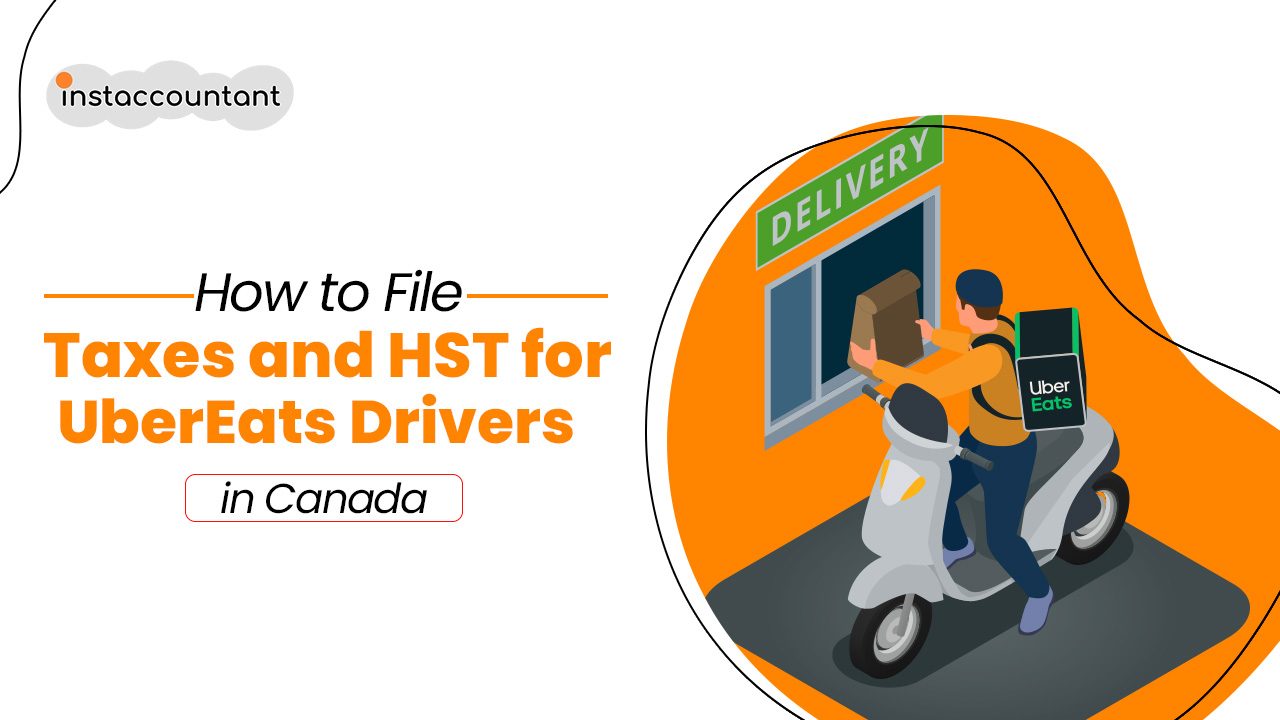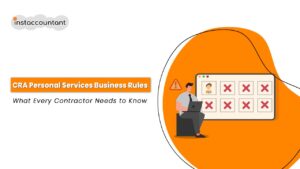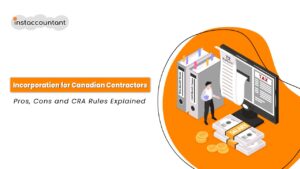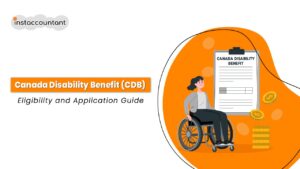If you’re a driver for one of the popular food delivery apps in Canada, such as Uber Eats, DoorDash, SkipTheDishes, Instacart, or Corner Shop, you might be wondering how to handle your taxes. After all, delivering food is not a typical job with a regular paycheck and a T4 slip. You are considered a self-employed contractor, which means you have to report your income and expenses, and pay taxes on your net profit. But you also have some tax benefits, such as being able to deduct certain expenses that can lower your taxable income.
In this guide, we will explain how to correctly file UberEats taxes as a self-employed food delivery driver in Canada, and how to claim all the deductions you’re eligible for. This will help you save money and avoid tax penalties.
Tax Guidelines for Uber Eats & Food Delivery Drivers
If you’re currently employed and also working as an Uber Eats driver, it’s important to note the difference between self-employed and employed income. Whether you are doing this as a part-time or full-time job, whether you are using a bike, a car or your own feet, you need to know some basic things about your tax obligations as an Uber Eats driver. When you work as an employee, your employer deducts income tax from your salary before paying you. However, as a self-employed individual, you’re responsible for calculating and paying your own income tax.
How to File Taxes for Uber Eats
As a self-employed delivery driver, you’re essentially running a small business. This means that you’ll have income from your food delivery services and expenses related to your business. It’s crucial to understand the tax implications of being self-employed and the types of taxes that may impact you:
- Income Tax: When it comes to taxes, three key obligations come into play: income tax, CPP (Canada Pension Plan) contributions, and EI (Employment Insurance) contributions. As a self-employed individual, you are responsible for paying your income tax by the designated deadlines. This means you’ll need to set aside money throughout the year to pay your income tax when filing your tax return. You have to file your tax return by June 15th of the each year. But, you have to pay any amount you owe by April 30th to avoid CRA interest charges.
- Harmonized Sales Tax (HST): Registering a business or obtaining a GST/HST number may be necessary, depending on your earnings and specific circumstances. If your revenue from Uber Eats exceeds $30,000, you’ll need to register for HST. You’ll be responsible for charging HST on your services and remitting it to the Canada Revenue Agency (CRA). The filing deadline depends on the reporting period, and there are various methods for filing GST/HST returns, including online filing directly to the CRA using GST/HST NETFILE.
How To Track Uber Eats Expenses
As a a self-employed Uber Eats driver, you need to keep your books in order and track your expenses. Good bookkeeping involves recording and organizing your income and expenses. This will not only help you with your tax obligations but also provide clarity and visibility into your finances. It’s important to keep receipts for all your business expenses and maintain them for at least six years, as required by the CRA.
Your vehicle is an essential asset, and properly tracking mileage and fuel expenses is crucial. By keeping detailed records, you can claim deductions for business-related vehicle costs. Using a dedicated bookkeeping app like Zoombooks can help you track your expenses and keep your records organized.
Tax Deductions and Write-Offs for Uber Eats Drivers
If you are an Uber Eats driver in Canada, you may be wondering how to save money on your taxes. One way to do that is to claim deductions for the expenses you incur while delivering food. Deductions are amounts that you can subtract from your income before calculating your tax. By claiming deductions, you can lower your taxable income and pay less tax.
Some of the expenses that you can deduct as an Uber Eats driver are:
- Vehicle expenses: You can deduct the cost of gas, repairs, insurance, and depreciation of your vehicle. However, you can only deduct the portion that relates to your delivery work. For example, if you use your vehicle 50% for personal use and 50% for delivery work, you can only deduct 50% of your vehicle expenses.
- Phone and internet expenses: You can deduct the cost of your phone and internet plan that you use for your delivery work. Again, you can only deduct the portion that relates to your work. For example, if you use your phone 40% for personal use and 60% for delivery work, you can only deduct 60% of your phone and internet expenses.
- Delivery bags and equipment: You can deduct the cost of any bags or equipment that you use to keep the food warm and secure while delivering. These include insulated bags, coolers, racks, or straps.
- Parking fees: You can deduct any parking fees that you pay while picking up or dropping off food orders.
- Cleaning and maintenance: You can deduct the cost of cleaning and maintaining your vehicle and equipment. This includes car washes, oil changes, tire rotations, or repairs.
- Professional services: You can deduct the cost of any professional services that you use for your delivery work. This includes tax preparation, bookkeeping, or legal advice.
- Promotion and marketing expenses: You can deduct the cost of any promotion or marketing activities that you do to attract more customers or increase your ratings. This includes flyers, business cards, stickers, or online ads.
To claim these deductions, you need to keep track of your income and expenses throughout the year. You also need to keep receipts or invoices for all your expenses. You will report your income and expenses on Form T2125, Statement of Business or Professional Activities, when you file your tax return.
Claiming deductions can help you save money on your taxes as an Uber Eats driver. However, you should also be aware of the rules and limitations that apply to these deductions. Be sure to consult with a tax professional or accountant to ensure you’re claiming the correct expenses and maximizing your deductions.
Reporting Income and Filing Taxes as an Uber Eats Driver
If you earn income from UberEats, you need to report it to the CRA and pay taxes accordingly. UberEats makes it easy for you by providing a tax summary that shows your annual income and potential business expenses. You can use this tax summary to report your income and claim deductions for things like miles driven, fees, taxes, and some costs. To avoid any mistakes or penalties, follow these steps on how to file Ubereats taxes correctly and efficiently.
- Gather the necessary information, such as annual tax summary from Uber Eats and receipts for tax-deductible expenses.
- Use the T2125 form (Statement of Business or Professional Activities), specifically designed for self-employed individuals, to report your income and business-related expenses.
- If you work for multiple platforms, accurately document your earnings from each to ensure a comprehensive tax report. Maintain organized records of your income from all sources.
- Finally
Keep in mind your tax filing deadline is different from employed individuals. The deadline for filing your tax return is June 15th of the following year. However, any balance owing is still due by April 30th to avoid interest charges. If you have HST obligations, you’ll need to file your HST return according to the assigned filing period.
The Benefits of Hiring an Accountant
If you’re an UberEats driver, you know how challenging it can be to file your taxes correctly. You fall under the category of self-employed, which means you are responsible for both the employer and employee part of taxes. That’s why it’s a smart idea to work with an accountant who knows the ins and outs of Uber, Uber Eats and delivery drivers taxes. Here’s why:
- A qualified accountant who specializes in Uber and delivery services can help you navigate the tax filing process. They keep up with the latest tax changes and can provide you with personalized advice based on your specific situation.
- Hiring an accountant may seem like an extra expense, but it can actually save you money in the long run. They can help you find deductions you may have missed and ensure your filing is accurate, avoiding potential CRA penalties.
Conclusion
To sum up, Uber Eats drivers in Canada need to be careful and diligent when it comes to filing taxes and HST. This guide provides the steps you need to follow to comply with the Canadian tax laws and report your Uber Eats income correctly. You can also benefit from the deductions and credits that are available to you as a self-employed person. Remember to keep track of your receipts, invoices and expenses throughout the year, and seek advice from a tax professional if you have any questions or doubts.
Thank you for choosing this guide as your resource, and we wish you all the best in your journey as a successful Uber Eats and food delivery driver!
Frequently Asked Questions
1- How do I get my Uber Eats tax summary?
Your Uber Eats tax summary is a document that shows your annual earnings and expenses from delivering food with Uber Eats. You can access your tax summary online through the Uber app or the Uber website. You will need your tax summary to file your taxes and claim Uber Eats deductions.
2- Do I have to report tips from Uber Eats as income?
Yes, you do. Tips are part of your income and must be included on your tax return, whether they are in cash or through the app. The CRA considers tips as income and expects you to report them accurately.
3- Do I need to charge HST on my Uber Eats income if I make less than $30k?
It depends on your total self-employment income from all sources, not just Uber Eats. If you make more than $30,000 in a year or in any four consecutive quarters from self-employment, you have to register for HST and collect and remit it on your sales. If you make less than $30,000, you can choose to register for HST voluntarily or not at all.
4- What expenses can I deduct from my Uber Eats income?
You can deduct any reasonable expenses that you incur to earn your Uber Eats income, such as gas, vehicle maintenance, insurance, phone, data plan, parking, tolls, bags, and equipment. You need to keep receipts and records of your expenses to support your claims.
5- How do I report my Uber Eats income on Form T2125?
Form T2125 is the form that you use to report your self-employment income and expenses on your tax return. You need to enter your gross income, expenses, and net income from your Uber Eats business on this form. You also need to enter the GST/HST paid if applicable.




